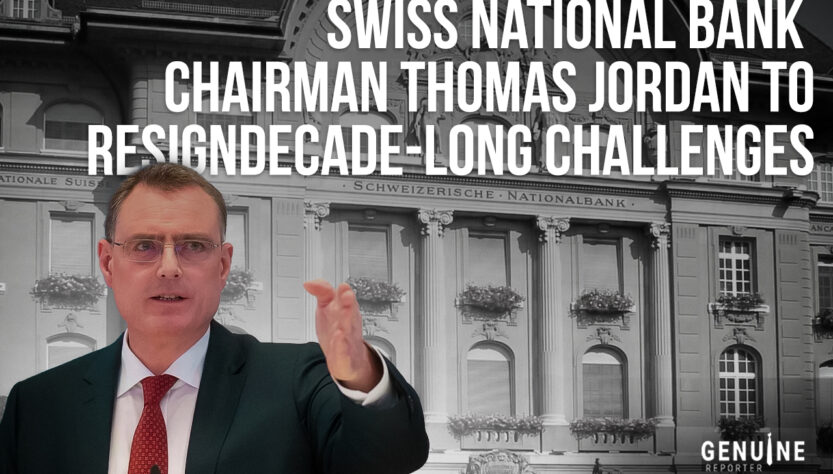After more than ten years in authority, Thomas Jordan, the Swiss National Bank’s chairman, will retire three years ahead of schedule in September. During that time, the central bank battled with crises such as the collapse of Credit Suisse and a strong currency.
The 61-year-old stated on Friday that, after joining the SNB in 1997, he believed the time was right to leave the organization. He has led the central bank through what may have been the most turbulent time in its 117-year existence as chairman from January 2012.
“Since I was elected to the board on May 1, 2007, there has been virtually no quiet period. One crisis has followed the next,” Jordan stated during a press conference.
Jordan was criticized for the SNB’s tardy response to the Credit Suisse crisis, which concluded in the failure of Switzerland’s second-biggest bank last year, even though the country prevailed in the fight against rising inflation.
Jordan stated that although he had considered leaving for some time, the Credit Suisse incident had not “in any way” affected his choice.
In an interview, he said, “I started some time ago to reflect about the timing…and I came to the conclusion that now is a good time.”
“Today we have again re-established financial stability, we have re-established the price stability, so I think it’s a good time for leaving office,” he stated.
Jordan expressed pride in achieving price stability throughout his term, with an average inflation rate of less than 1% in Switzerland.
Critics of his term, however, have also called for a reform of the central bank’s structure, arguing that Jordan holds too much authority and that not enough women have been given leadership positions.
When asked if the SNB should look inside or elsewhere for a replacement, or if a woman should take his position, he remained silent.
Martin Schlegel, the current vice chairman of the SNB and Jordan’s deputy, or Andrea Maechler, the first female member of the SNB’s governing board who departed the bank last year to join the Bank for International Settlements, are possible successors.
There has also been discussion of Renaud de Planta, senior partner at Pictet, a private bank in Switzerland. The heir needs to be a Swiss national.
Jordan steps down before his tenure was scheduled to expire in 2027, but he will be replaced in the customary way: the Swiss government will have to approve a nominee that comes from the SNB’s supervising bank council. The process permits the nomination of an outsider.
Jordan, who underwent a cardiac procedure in 2021, informed reporters that his decision to resign was unrelated to his health. When asked about his future intentions, Jordan said that he had none and that he would devote himself entirely to the SNB until the end of September.
Following the news, the value of the Swiss franc declined relative to the euro, with the single currency rising by 0.2% to its highest level since November.
Just before the world financial crisis hit in the middle of 2007, Jordan joined the central bank’s interest rate-setting governing board. He later rose to the position of chairman following the resignation of his predecessor, Philipp Hildebrand, due to his wife’s involvement in dollar and euro transactions.
Jordan’s appointment as chairman until 2027 was renewed by the Swiss government in 2020.
“He did a superb job and will be very difficult to replace,” J.Safra Sarasin economist Karsten Junius stated. “But maybe the end of his era is also a chance to broaden decision-making at the SNB.”
The Harvard-educated economics professor, who is often regarded as the model of a diligent technocrat, has no problem making difficult judgments.
The SNB abruptly eliminated the minimum exchange rate against the euro in 2015, upending the currency markets and sending the safe-haven currency skyrocketing.
Jordan has concentrated on fighting inflation in recent years, which, albeit being high in Swiss standards, has been far lower than in other regions of the world.
He helped the SNB provide emergency financing last year to enable Credit Suisse to be saved from bankruptcy by its larger competitor UBS (UBSG.S), which opens a new tab.
Critics of the SNB’s early crisis reaction have criticized the bank for being too cautious and hesitant to act, even though the central bank had worries about the lender as early as February 2020.
Jordan attempted to nationalize Credit Suisse and infuse 50 billion Swiss francs into the company around six months prior to the sale. However, the government and banking regulators prevented this from happening.
Economists concluded that Jordan, who designed the ultra-loose monetary policy of the SNB before shifting course and raising rates in 2022, had performed well in his capacity.
Despite his natural caution, Jordan was not afraid to use unconventional strategies to combat the strength of the Swiss franc, even while the haven currency was facing severe pressure to appreciate. One such strategy was the introduction of negative interest rates.
“The SNB is characterized by Thomas Jordan’s way of thinking so there is unlikely to be much change of approach, at least for the foreseeable future,” Alessandro Bee, an economist at UBS, said. “Overall, he has done a very good job.”
Jordan’s exit, according to Stefan Gerlach, chief economist of Switzerland’s EFG Bank and participant in the SNB Observatory, an organization that pushes for responsibility at the central bank, nonetheless signifies a profound shift.
“Having been a board member since 2007 and with his indisputable expertise, Jordan has become the SNB.”
- Published By Team Genuine Reporter

